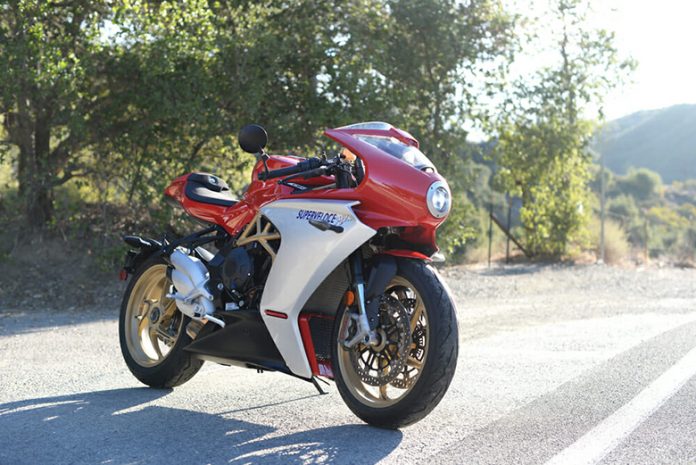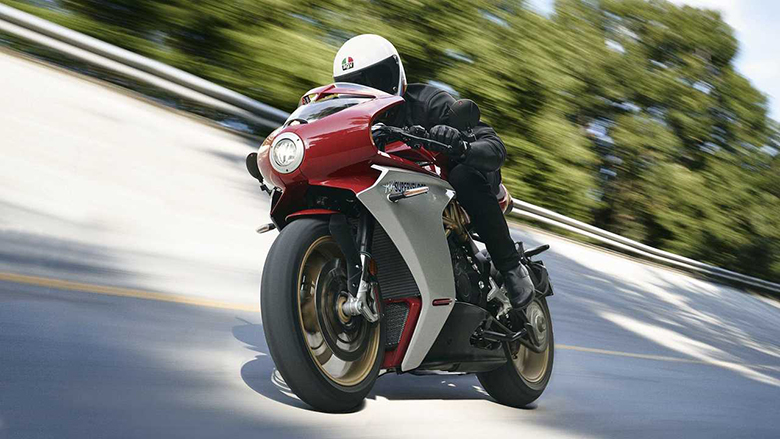If you are a fan of the brand’s sporty heritage with a modern touch, then the Superveloce 800, an homage to that heritage with a contemporary twist, is a must-have in your collection. The Superveloce 800 is appropriately defined as extreme because of its unique design, which incorporates past parts while still using innovative technology. And this is not all. The radical nature of its shapes changes everything about vintage motorcycles.
MV Agusta 2021 Superveloce 800 Sports Bike – Features and Specs
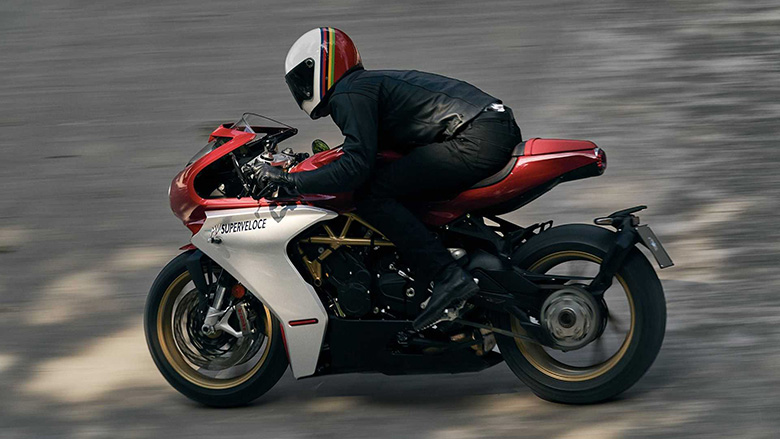
Design and Outfitting
A new range of unique antique motorcycles from San Marino’s CRC Style Centre breaks new ground in a sector where the same aesthetics have been seen again for many years. In the early phases of Virtual Styling, CRC and MV Agusta designers were immersed in immersive virtual environments.
They are using innovative hardware like virtual reality headsets and innovative real-time rendering technologies, as well as creating fresh and unique experiences that pique the interest of viewers. As a result, the fairing’s forms are sleek and functional; they protect the rider without being too decorative. Precision in the design ensures that all screws and points for attaching goods to the frame are hidden from view.
The sculptural and vividly evocative character of the extended top fairing, the long and virtually concealed tail fairing, and the massive side panels are evident.
The thirty-seven world championships the firm has won are commemorated in various ways. As a result, each sight is a bridge to the present, interpreted with a distinct boldness and awareness.
To save weight, the Superveloce 800 utilizes superstructures built from thermoplastic materials that are incredibly lightweight and robust. The painting has been meticulously applied, with many coats of color and a final clear coat.
The complete LED twin-function poly-ellipsoidal twin-function element is used in the front light cluster. Built inside the instrumentation bracket are LED day running lights. The Superveloce 800’s rear circular light cluster was similarly built with LEDs.
As with the Oro’s Brutale 1000 Series, the 5″ TFT color display has been modified to provide a specific graphic solution. On the left control, there is a multi-functional joystick that may be used to enter the menu. A Bluetooth smartphone connection enables the instruments to do various tasks, including receiving incoming calls, sending messages, and playing music. The MV Ride App’s sophisticated navigation features may be accessed via mirroring. In addition, the app has a “smart” mode phone data on bike usage and routes, which may be augmented with any multimedia material wanted and shared with worthy friends or other app users. This app’s features go well beyond social networking; it allows you to customize your vehicle’s electronic settings (such as maps, traction control, and quick electronic shift) right from your smartphone.
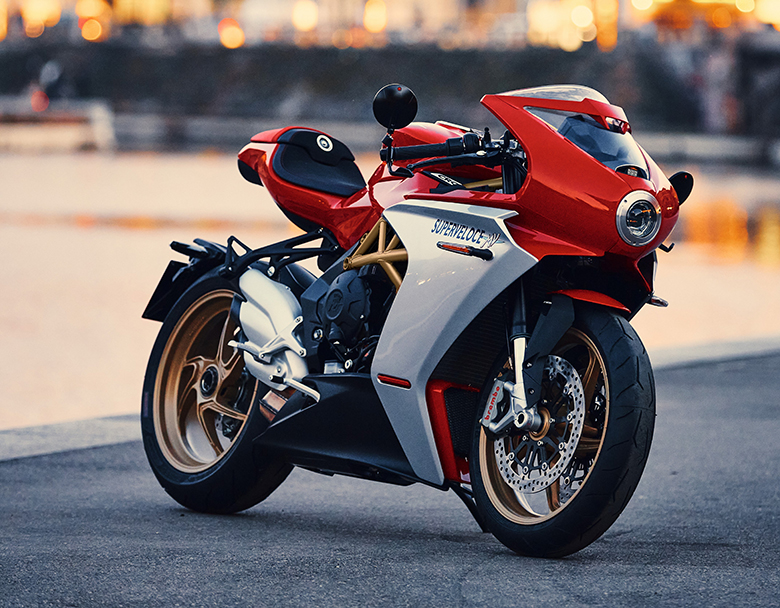
Engine and Electronics
Superveloce 800’s three-cylinder in-line engine represents perfection in motors of this kind, owing to its benchmark performance, excellent thermodynamic efficiency, low weight, and overall compactness. The counter-rotating crankshaft, a technology that has become popular over time, is one of the bike’s unique technological characteristics.
A dual overhead camshaft controls the twelve-titanium intake and exhaust valves. Bore and stroke specifications (79×54.3) allow for a displacement of 798 cubic centimeters, with power and torque ratings identical to those of the F3 800 at 13,000 RPM and 88 Nm at 10,600 RPM. When equipped with the (optional) dual exhaust for track usage, the Superveloce 800 generates 153 horsepower at the rear wheels through two exhaust pipes on the right and one on the left.
RPM: 13,250
The three exhaust pipes overlapping on the right side of all three-cylinder MVs is the typical exhaust layout, making all three-cylinder MVs readily identifiable.
The engine has been entirely remapped for the Superveloce 800 to increase output flexibility and maintain the customary responsiveness to the throttle.
Additionally, there are eight levels of Traction Control and an option to turn it off on the Superveloce 800’s MV EAS 2.1 Up & Down electronic gearbox, both of which are standard equipment for this model, bringing the total number of electronic options on the F3 800 up to four.
Suspension, Chassis, and Brakes
The MV Agusta 2021 Superveloce 800 Sports Bike is based on the F3 800, with most of its proportions being duplicated. The front and rear subframes are unique to this model, but the side plates and center lattice are shared with the sports F3. To make it more user-friendly and less restrictive than the F3 800, a motorcycle developed for track usage, the riding posture has been tweaked.
We allow the spring preload adjustment and the hydraulic compression and rebound of the fork and shock absorber.
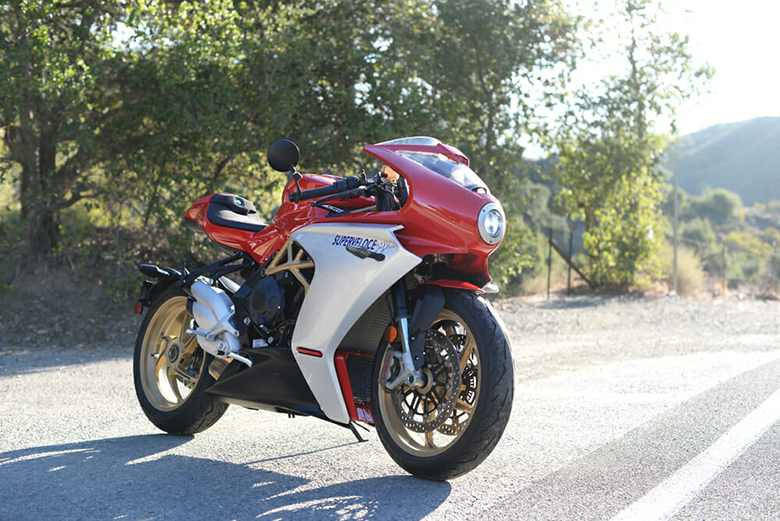
The fork and shock absorber are Marzocchi products with 43 mm-diameter stanchion tubes. The F3-like link in the rear suspension ensures a more comfortable ride as the wheel starts to rotate. The MV Agusta 2021 Superveloce 800 Sports Bike’s shock absorber is likewise unique to the model, specifically chosen for it.
There are four pistons in each caliper, each measuring 34 mm, and two pistons in the rear caliper, attached to a 220 mm-diameter disc. The Brembo brake system is known for its functionality and racing look. Using RLM (Rear wheel Lift-Up Mitigation), the Bosch ABS 9 Plus system with Race Mode keeps the rear wheel firmly planted while stopping.
The open three-way exhaust, which may be used in conjunction with the specialized control unit, the carbon fiber rear mudguard, and the tail fairing for single-seat saddles, are a few options available in the aftermarket. Awe-inspiring are the wheels’ beautiful aluminum alloy spoked design.
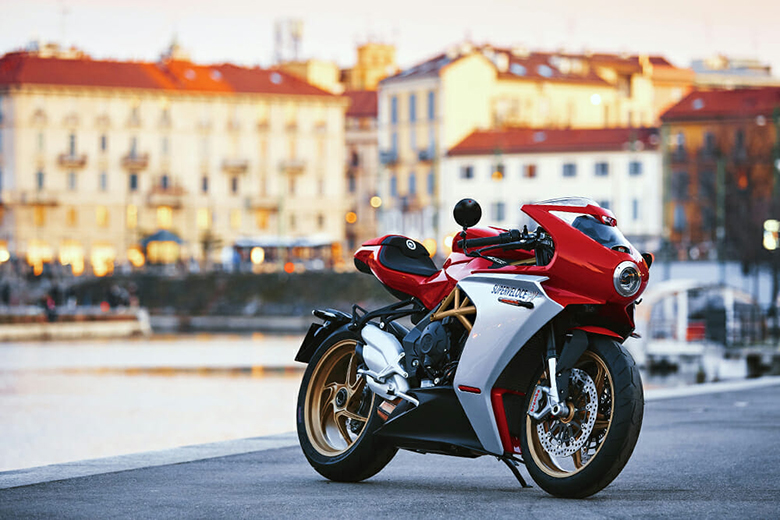
MV Agusta 2021 Superveloce 800 Sports Bike – Technical Specifications
Engine
| Type | Three-cylinder, four strokes, 12 valve |
| Timing system | “D.O.H.C” including mechanical chain tensioner |
| Total displacement | 798 cm3 (48.7 cubic inches) |
| Compression ratio | 13.3:1 |
| Starting | Electric |
| Bore x stroke | 79mm x 54.3mm (3.1 inches x 2.1 inches) |
| Maximum power – RPM (at the crankshaft) | 108 kW (148 hp) at 13,000 RPM |
| Maximum torque – RPM | 88Nm (8.97kgm) at 10,600 RPM |
| Cooling system | Cooling with separated liquid and oil radiators |
| Electronic quick shift | MV EAS 2.1 (Electronically Assisted Shift Up & Down) |
| Clutch | Wet, multi-disc slipper clutch |
| Transmission | Cassette style; six speed, constant mesh |
| Primary drive | 22/41 |
| Final drive ratio | 17/43 |
Electrical Equipment
| Voltage | 12 V |
| Alternator | 350 W at 5000 r.p.m. |
| Battery | 12 V – 8.6 Ah |
Dimensions and Weight
| Wheelbase | 1380 mm (54.33 in.) |
| Overall length | 2030 mm (79.92 in.) |
| Overall width | 730 mm (28.74 in.) |
| Saddle height | 830 mm (32.68 in.) |
| Min. ground clearance | 120 mm (4.72 in.) |
| Trail | 99 mm (3.89 in.) |
| Dry weight | 173 kg (381.4 lbs.) |
| Fuel tank capacity | 16,5 l (4.36 U.S. gal.) |
Performance
| Maximum speed | 240.0 km/h (149.1 mph) |
Frame
| Type | ALS Steel tubular trellis |
| Rear swing arm pivot plates material | Aluminum alloy |
| Type | Marzocchi “UPSIDE DOWN” telescopic hydraulic fork including rebound-compression damping and spring preload external & separate adjustment |
| Fork dia. | 43mm (1.69 inches) |
| Fork travel | 125mm (4.92 inches) |
Rear Suspension
| Type | Progressive Sachs, solo shock absorber with rebound and compression damping and spring preload adjustment |
| Single-sided swing arm material | Aluminium alloy |
| Wheel travel | 123mm (4.84 inches) |
Brakes
| Front brake | Double floating disc including 320mm (12.6 inches) diameter, with steel braking disc and flange |
| Front brake caliper | Brembo radial-type monobloc, with four pistons 34mm (1.34 inches) |
| Rear brake | Single steel disc with 220mm (8.66 inches) diameter |
| Rear brake caliper | Brembo with two pistons – Ø 34 mm (Ø 1.34 in.) |
| ABS | Bosch 9 Plus including Race Mode and RLM (Rear wheel Lift-up Mitigation) |
Wheels
| Front: Material/size | Aluminum alloy 3.50 ” x 17 ” |
| Rear: Material/size | Aluminum alloy 5.50 ” x 17 ” |
Tires
| Front | 120/70 – ZR17M/C (58 W) Pirelli Diablo Rosso Corsa II |
| Rear | 180/55 – ZR17M/C (73 W) Pirelli Diablo Rosso Corsa II |
Fairing
| Material | Thermoplastic |
Emissions
| Environmental Standard | Euro 4 |
| Combined fuel consumption | 6.4 l/100 km |
| CO2 Emissions | 157 g/km |

